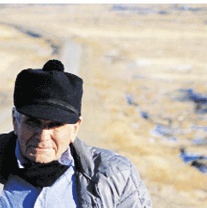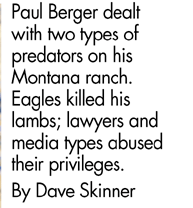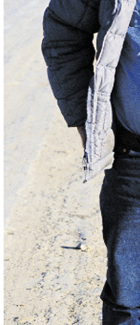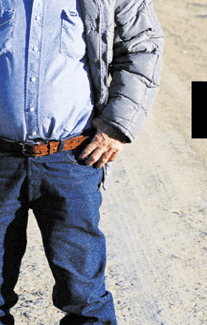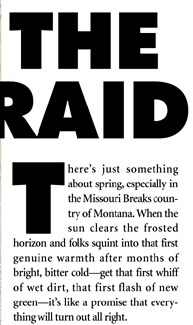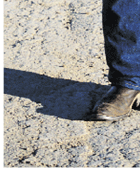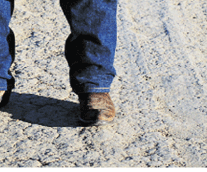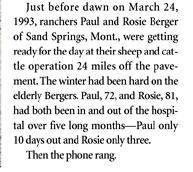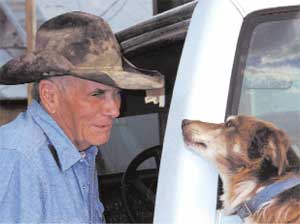|
|
|
| Subscriptions click here for 20% off! | E-Mail: info@rangemagazine.com |
|
|||||||||||||
|
A neighbor had spotted a 10-car convoy of wildlife agents on the way to the Berger ranch. The 21 agents had federal warrants to search for evidence “which would document the taking of wildlife in violation of federal laws.” Berger’s attempts to deal with predators had attracted predators of another sort, it seems. Not all the raiders were federal police agents. Three were Turner Broadcasting System staff, recording sound and video for a future Cable News Network “Earth Matters” program, a fact deftly concealed from Berger at least once. Garfield County Sheriff Charles Phipps arrived several hours into the search and demanded a list of participants. He learned that the three CNN crew were not named in the search warrant, and booted them off the property. But once out of sight, the CNN people sneakily rejoined agents on another part of the ranch and continued their illegal, unauthorized filming. How could this happen? In 1992, CNN correspondent Jack Hamaan was assigned a story on government predator control. His inquiries resulted in a contact, an “undercover” U.S. Fish & Wildlife Service (FWS) agent who suggested Hamaan contact Assistant United States Attorney Kris McLean. The two made and signed an agreement that CNN cameramen would record video and wire agents for sound, but only broadcast the material after the expected court proceedings were underway, so as not to taint the court. This agreement was signed March 11, 1993. The search warrant was issued a week later on March 18, a pre-raid briefing was held the evening of the 23rd, and the raid came March 24—the last two being taped by CNN crews. Trouble is, the agreement violated any number of Department of Justice (DOJ) policies regarding the media. In a nutshell, policy was to keep media outside the perimeter and not say anything that might throw the case. Any
exceptions were to be cleared with DOJ’s Office of Public Policy in advance. But Kris McLean didn’t bother with policy. He didn’t even bother to tell his boss, U.S. Attorney for the District of Montana, Doris Poppler, about the planned raid. She only learned of McLean’s raid in the wee hours of March 23 and 24. In a court deposition, Poppler testified that she then called McLean and told him “he could not take the CNN crew with him,” unless McLean contacted the Washington office and Poppler got proper verification. McLean rang Poppler back “and said he didn’t bother to call D.C., that in his opinion he didn’t have to.” Sounds like a firing offense, doesn’t it? Well, according to American Lawyer Media staff reporter Jonathan Ringel: “Poppler says she would have fired McLean for his insubordination ‘if he weren’t such an excellent prosecutor.’ Instead, she formally reprimanded him and attributed her inability to control McLean to her lame duck status.” Lame duck? Yes. Poppler was a George H. W. Bush presidential appointee, and Bill Clinton had just become President. Poppler was replaced by a Clinton appointee a month later while McLean continues his “justice” career to this day. McLean’s misconduct was never reported by CNN. Worse, “watchdog” CNN indulged in deceptions (’scuse me, editing) of its own. CNN’s “Ring of Death” TV show was first broadcast two days before Berger’s misdemeanor sentencing—yes, misdemeanor. Despite the anemic penalty, according to a Northwestern University law brief by Laurel Druley, CNN’s “program portrayed the raid as a success and never mentioned that the investigators failed to find any poisoned eagles on the ranch.” The raid and prosecution was a big, fat zero—but CNN chose not to report it as such. So what really happened, and why? CNN’s Jack Hamaan actually asked McLean, “Why let us come along on a raid like this? What benefit could it be?” The answer: “Well, it’s really, uh, motivated by the prosecutor’s self-interest...the publicity and the story that you’ll do. Uh, getting out there and being heard by lots of people....” So, like another federal fiasco that occurred in the spring of 1993, the raid on the Berger place really wasn’t motivated by a desire to catch criminals. It was a joint effort by showboating federal law officers and slanted journalists to stage what the Ninth Circuit Court sneeringly called “television entertainment,” a worldwide public-relations lynching of ranchers in the court of public opinion, more specifically Paul Berger.
What the lynch mob forgot was that ranchers know the ropes, too. Berger hired two respected litigators from the Billings-based Moses Law Firm, Charles “Timer” Moses and Jay Lansing. FWS initially charged Berger with killing 17 eagles, plus gulls and ferruginous hawks, but Moses and Lansing beat back the government hangmen on nearly every point. For starters, the CNN raid and another later search produced almost no evidence. When the dust settled, Berger was found guilty only of one count of illegal use of the pesticide Furadan, a misdemeanor violation with a final sentence of 40 hours of community service and a $1,000 fine. When Berger’s criminal trial concluded, Timer Moses told Paul, “If you ever need me again, give me a call,” to which Berger shot back, “You’re not done yet!” Paul’s father had homesteaded north of the river, near Content, in 1918. But with 10 inches of annual moisture, it was hard to prove up right away. Paul was therefore born in Kellogg, Idaho, where his dad was working the winter of 1921 in the mines. Hard times (including the Depression) meant Paul was raised mostly by relatives and struck out on his own very early. He bought and sold a cow at a time until he had a herd, and bought and sold several places north and south of the Missouri until the chance came to buy the place on the north fork of Lodgepole Creek in 1958. Through hard work, marriage, and the death of Rosie’s parents (who owned the place next door), the Bergers had, by 1993, 700 head of cattle and several thousand sheep running over a total 75,000 acres, mostly BLM, with 7,000 deeded and/or improved acres. A fine spread by all counts. While most folks would say the Bergers were entitled to enjoy the fruits of a lifetime lived hard and well, the raiders obviously didn’t think so. What the raiders failed to understand is that folks who live hard and well tend to fight hard and well. As Berger says today, “I wasn’t about to let those sneaky bastards get away with what they did to me.” So Timer, Jay, Paul, and Timer’s son, lawyer Mike Moses, put their heads together and decided to pursue a civil action against the raiders. Mike was particularly interested with a precedent-setting case argued by
Los Angeles attorney Henry Rossbacher in 1992. CBS had filmed a Secret Service raid. The Wall Street Journal reported that the agents approached Babatude Ayeni’s wife and young son, then “snatched a magazine the woman was holding and ordered them to look into the camera of a crew from CBS’s ‘Street Stories’ that had been invited along.” The New York U.S. District Court judge ruled CBS “had no greater right than that of a thief to be in the home,” and when that ruling was upheld in the U.S. Second Circuit Court of Appeals, both CBS and the Secret Service settled out of court. Rossbacher was recruited to join Mike Moses and Jay Lansing in the civil action. In a recent telephone interview, Rossbacher outlined why the Berger/Ayeni cases are important: First, when “law enforcement controls press access, the press becomes an arm of the state.” Furthermore, “what’s evil about such an arrangement is that it violates not just the Fourth Amendment privacy rights of individual citizens, but it corrupts the intent of the First Amendment by changing the press from government watchdog to government partner.” It goes without saying that corrupting any part of the Bill of Rights threatens all of it. Nonetheless, after CNN lost to the Bergers in the Ninth Circuit Court, The Washington Post and two dozen media organizations formally joined CNN in arguing before the Supreme Court that “Investigative journalism is an important part of today’s television market and entitled to all the safeguards of the First Amendment.” The Supreme Court was “unimpressed” by such unthinking, and handed down a complex ruling re-balancing the Fourth and First Amendments. According to Jay Lansing, the ruling clarified “that any future incidents will result in liability for all parties, with no qualified immunity for either police or press misconduct.” Unfortunately, the lack of a set policy for law enforcement at the time of the raid released the Berger raiders from direct liability. But the Fourth Amendment was and is clear enough that the Supreme Court sent the question of CNN/TBS’s liability for its unconstitutional role in the Berger raid back to the district level where the dispute was settled after eight years, in May of 2001. Lansing says the bottom line is “There is no First Amendment right to violate the law.” Abusive news outlets and police agencies that break the law will be held liable in the future. Period. That’s simple, common-sense justice, but getting there was, as Lansing reflects, “a long journey—which only a person with Paul Berger’s perseverance could undertake.” Berger had to persevere through a lot. The legal war burned up years—years which the other side probably hoped a man with emphysema and congestive heart trouble wouldn’t have. The strain further contributed to the end of Paul’s marriage to Rosie and the splitting of the main ranch. These days, the place is leased out. With 30 percent lung function, Paul has pretty much retired, but spends as much time on the ranch as possible, doing what he can. He now has time to enjoy not only the cattle, which still carry the Berger Two-Reverse-Seven-Over-Bar brand on their sleek, fat hides, but a new marriage, to Montana native and writer Helen Arthur-Berger—the daughter of an old-time Montana “filly chaser.” While the terms of the settlement are confidential, its implications are not. The determination of a “crusty” Montana rancher who wanted to “come back at them for what they did” means that while ranchers will still have to deal with the usual predators, predators with badges and cameras will have to look elsewhere for a free meal. Dave Skinner is a freelance writer from Whitefish, Mont. |
|||||||||||||
|
Spring 2002 Contents To Subscribe: Please click here or call 1-800-RANGE-4-U for a special web price Copyright © 1998-2005 RANGE magazine For problems or questions regarding this site, please contact Dolphin Enterprises. last page update: 04.03.05 |
|||


